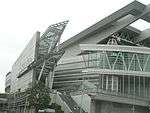Saitama Super Arena
Saitama Super Arena (さいたまスーパーアリーナ, Saitama Sūpā Arīna) is a multi-purpose indoor arena located in Chūō-ku, Saitama City, Saitama, Japan. It opened preliminarily on May 5, 2000, and then officially opened on September 1 of the same year. Its spectator capacity is 36,500 at maximum settings,[3] making it the fourth largest indoor arena in the world. The main arena capacity is between 19,000 and 22,500.
 | |

| |
| Location | 8 Shintoshin, Chūō-ku, Saitama, Saitama, Japan |
|---|---|
| Coordinates | 35°53′41.60″N 139°37′51.00″E |
| Public transit | Saitama-Shintoshin ■ Takasaki Line ■ Utsunomiya Line ■ Keihin-Tōhoku Line Kita-Yono ■ Saikyō Line |
| Owner | Saitama Arena Corp. |
| Capacity | 36,500 |
| Construction | |
| Opened | September 1, 2000 |
| Construction cost | YEN ¥ 20 billion USD $ 195 million EUR € 142 million |
| Architect | Dan Meis[1] Ellerbe Becket[2] |
The arena was designed by Dan Meis, who at the time was working for architecture firm Ellerbe Becket,[4] together with Nikken Sekkei. Meis's design was selected as a result of an international design competition.[5] The arena features a gigantic movable section of seating which can reduce capacity for smaller events and create a more intimate setting.
It is a favorite venue for puroresu (Japanese professional wrestling) and mixed martial arts (MMA), and has hosted many of the biggest fights in MMA history. It has also hosted other sports events such as boxing, basketball, volleyball, tennis, ice hockey, gymnastics. It is also the only Japanese arena equipped especially for American football.
It formerly housed the John Lennon Museum, which displayed John Lennon memorabilia and closed in 2010.
Access
- Immediate to JR East Keihin-Tōhoku|Utsunomiya|Takasaki|Ueno-Tokyo Line Saitama-Shintoshin Station
- 7 minutes' walk from JR East Saikyō Line Kita-Yono Station
Events[6]
Martial arts and professional wrestling

The Saitama Super Arena has hosted a major martial arts event on New Year's Eve since 2001. It was sanctioned by Pride Fighting Championships from 2003 to 2006. The 2007 edition was hosted by Yarennoka, an MMA promotion organized by the former staff members of Pride Fighting Championship. Dynamite!! 2008 featured Dream and K-1 fights. Dynamite!! 2009 featured fights by Dream, Sengoku and K-1. Dynamite!! 2010 featured Dream and K-1 fights. Fight For Japan: Genki Desu Ka Omisoka 2011 featured fights by Dream, K-1 and IGF. The 2012 edition featured Dream and Glory fights. Since 2015 the event is the final round of the Rizin Fighting Federation.[7]
On February 7, 2005 the arena hosted WWE Raw for United States cable television network Spike TV. The main event of the Raw hour was Ric Flair vs. Shawn Michaels, and the main event of the Raw Zone hour featured Triple H against Edge for the World Heavyweight Championship.
On November 29, 2009, the arena hosted one of the biggest fights in Japan's history as WBC Flyweight Champion Daisuke Naito defends his title against Koki Kameda.
The arena hosted the Japanese return of the Ultimate Fighting Championship on February 26, 2012 for UFC 144. Followed by UFC on Fuel TV: Silva vs. Stann on March 3, 2013 and UFC Fight Night: Hunt vs. Nelson on September 20, 2014 as well as UFC Fight Night: Barnett vs. Nelson on September 26, 2015.
On November 7, 2019, Japanese bantamweight boxer Naoya Inoue defeated Nonito Donaire at the arena to claim the 2018–19 World Boxing Super Series.
Other sports
It is one of two home arenas of the Saitama Broncos basketball team.
In 2000, the arena hosted two NHL ice hockey games between the Nashville Predators and the Pittsburgh Penguins.
In 2003, NBA basketball teams Seattle SuperSonics and the Los Angeles Clippers, played two regular season games. In 2006, the arena hosted the knockout stage of the Basketball World Championship 2006. In 2019, the Houston Rockets and Toronto Raptors played two preseason games at the arena.
The 2014 and 2019 World Figure Skating Championships were held at the venue.
The arena will host basketball competitions at 2020 Summer Olympics hosted by Tokyo.
Music
Besides sport and martial arts competition, there were held many music events, like Music Station, Hey! Hey! Hey! Music Champ, Animelo Summer Live, or humanitary Dream Power concerts organized by Yoko Ono.[8] Many notable Japanese music acts performed at the arena, alphabetically: Utada Hikaru, AKB48, Namie Amuro, B'z, Babymetal, Bump of Chicken, Minori Chihara, Masaharu Fukuyama, Gackt, Glay, Ayumi Hamasaki, Tomoyasu Hotei, The Gazette, Janne Da Arc, Kamen Joshi, Berryz Kobo, Mai Kuraki, L'Arc-en-Ciel, Luna Sea, Nana Mizuki, Man with a Mission, Momoiro Clover Z, Morning Musume, Mr. Children, Nightmare, Nogizaka46, Kana Nishino, One Ok Rock, Pierrot, Radwimps, Sakamoto Maaya, Scandal, Shiina Ringo, Siam Shade, Sid, Spyair, Sound Horizon, Vamps and fripSide.
Some anime projects like Uta no Prince-sama, Love Live!, K-On!,[9] The Idolmaster,[10] and Touken Ranbu have featured live performances at the arena.
International artists also performed there, like Madonna, Janet Jackson, Whitney Houston, Mariah Carey, Guns N' Roses, Beyoncé, Linkin Park, Ariana Grande, Coldplay, Lady Gaga, Avril Lavigne, Backstreet Boys, Muse, DragonForce, Metallica, Radiohead, AC/DC, Jeff Mills, Taylor Swift, U2, Iron Maiden, One Direction, Katy Perry, and K-pop acts BoA, TVXQ, Super Junior, BTS, SS501, Kara, Girls' Generation, Apink, Big Bang, 2PM, F.T. Island, 2NE1, Shinee, CNBLUE, Seventeen, Kim Jae-joong, Exo, Twice and NCT 127. Queen + Paul Rodgers performed there and the concerts were depicted in the concert DVD Super Live in Japan. Green Day taped the show for their new live album titled Awesome as Fuck. The Coverdale's band Whitesnake during the Loud Park Festival recorded their performance for a live album Made in Japan. The Festival has also had other internationally renowned rock and metal bands like Scorpions, Amorphis, Nightwish, Exodus and Slayer.[11] Due to his particular brand of Electronic Metal, Venezuelan DJ Zardonic played a guest set at the Big Rock Stage, making it the first time in history that an Electronic Producer performs at the festival.[12][13]
Gallery




.jpg)
See also
- U Arena, a venue near Paris similar in concept to the Super Arena
References
- architect Dan Meis
- Saitama Super Arena Archived 2011-06-11 at the Wayback Machine architect Ellerbe Becket
- "Facility Information | SAITAMA SUPER ARENA". SAITAMA SUPER ARENA. Retrieved 2018-01-19.
- "Saitama Super Arena". https://www.mondoworldwide.com. Retrieved 2019-05-10. External link in
|website=(help) - "Saitama Super Arena". https://www.mondoworldwide.com. Retrieved 2019-05-10. External link in
|website=(help) -
- ja:さいたまスーパーアリーナ as of 2007-07-04T07:48:17
- Rizin debut leaves questions unanswered - Dave Meltzer, 6 January 2016
- "Dream Power Super Live events history". Dream Power (in Japanese). Retrieved 2014-10-04.
- Morrissy, Kim (September 2, 2019). "K-ON! Band Ho-kago Tea Time Makes Surprise Appearance at Animelo Summer Live 2019". Anime News Network. Retrieved March 14, 2020.
- Kidani, Takaaki (November 6, 2018). "ブシロード 木谷高明が語る、『バンドリ!』プロジェクトの軌跡と未来 「何十年も続く作品にしたい」" [Bushiroad's Takaaki Kitani talks about BanG Dream!'s project trajectory and future: "I want to make a work that will last for decades"] (Interview) (in Japanese). Interviewed by Kenji Sunaga. Real Sound. Retrieved March 14, 2020.
- "ENGLISH – LOUD PARK 16". Retrieved 2017-01-14.
- "Zardonic Interview – LivingTheVanLife". Retrieved 2017-01-14.
- "ZARDONIC Releases "Pure Power" Lyric Video Off 'Antihero' – Clubhead TV: Clubhead TV". Retrieved 2017-01-14.
External links
| Preceded by Conseco Fieldhouse Indianapolis |
FIBA World Cup Final Venue 2006 |
Succeeded by Sinan Erdem Dome Istanbul |
